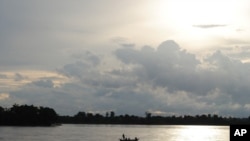Poor water quality caused by pollution is harmful for the more than 60 million people in 5 nations who depend on the Mekong River for drinking water. It also endangers wildlife in Southeast Asia, one of the world's most bio-diverse regions. And it hurts the fishing industry, an important export business and local food source.
The United States is committed to fostering multilateral solutions to the problems faced by people living in the Lower Mekong River Basin. For example, the United States and groups in Laos are working together to restore a wetland near the capital, Vientiane, polluted by years of sewage and industrial waste dumping. The That Luang Marsh protects the Mekong River system by filtering and naturally purifying water before it enters the river and groundwater system. With funding from the U.S., the marsh is being cleaned up and reconstructed. Plans have been developed to help the Lao government better manage the area in the future to preserve this precious resource.
Agricultural, urban, industrial and mining wastes are major sources of pollution throughout the Mekong River basin. Untreated discharges are so numerous that even monitoring the flows – the first step in cleaning up and controlling these contaminants – can be difficult. In another effort to assist the people of Southeast Asia to protect their environment, the U.S. Geological Survey is conducting cooperative ecological research projects with and providing training for Mekong scientists.
This past summer, such training was offered in Cambodia and another course will be held next year in another country in the Southeast Asia region. The U.S. State Department, through its regional environmental office based at our embassy in Bangkok, has awarded a $200,000 grant to an university network spanning across Laos, Cambodia, Thailand, and Vietnam to do research on sources and levels of pollution in the Mekong. This one-year grant is being administered by the International Crane Foundation and will foster regional cooperation in land-based marine pollution prevention.
Protecting and managing a vital natural resource like the Mekong River is a transnational challenge. Regional cooperation is essential to meeting that challenge, and the United States is committed to furthering that effort.
The United States is committed to fostering multilateral solutions to the problems faced by people living in the Lower Mekong River Basin.




